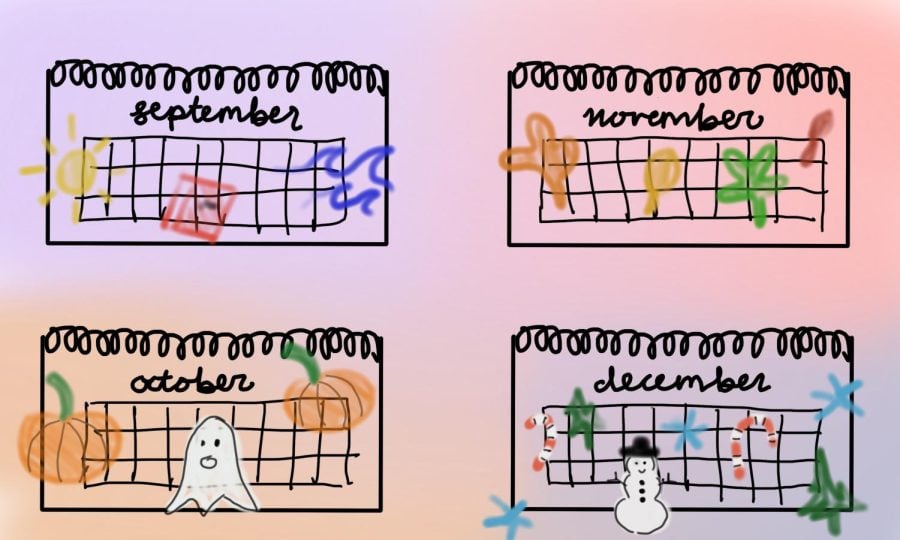Students hope for change, but Northwestern’s Fall Quarter calendar remains the same
Students expressed frustration with the two-week period between Thanksgiving and winter break.
December 1, 2022
While many students see Thanksgiving break as an opportunity to rest and spend time with their families, Communication sophomore Evelyn Mulchrone had assignments hanging over her head all week. Worse yet, Mulchrone said when she returned to campus for Reading Week, she found it challenging to motivate herself to finish out the quarter.
“Maybe if (Thanksgiving break) was a little bit longer, I would be more motivated to get back into the swing of things,” Mulchrone said. “But because it’s so short, I feel like I barely had any time at home and then it’s sort of like whiplash because it’s gonna be winter break again soon”
If Northwestern’s quarter system is seen as a set of trade-offs, the Fall Quarter schedule is seen by many students as a burden. Some students said the two-week period between Thanksgiving break and winter break — which consists of reading week for Weinberg followed by exam week — stresses their budgets, time management and motivation.
Faculty have also expressed that the calendar makes it challenging to schedule classes around Thanksgiving.
Bienen and Weinberg sophomore Emily Amesquita said she appreciates the quarter system because it allows her to pursue various areas of study. However, she said the current Fall Quarter calendar is counterintuitive.
“After nine and a half weeks I am burnt out,” Amesquita said. “I find myself looking forward to Thanksgiving break for at least half the quarter only to have a very small break, and then a week or two of studying and exams only to have another break.”
Amesquita said starting earlier in September would solve this problem and would also reduce the amount of time students are alone at home while their friends on semester schedules are already at school.
Some other universities on the quarter system, such as DePaul University and Dartmouth College, begin their fall quarters immediately after Labor Day, allowing winter break to run from Thanksgiving through New Year’s Day.
Michael Curry, a sophomore at Dartmouth, said the long winter break allows students to pursue other interests, such as working or traveling.
“I actually love finishing before Thanksgiving,” Curry said. “The last two weeks, things might be a little bit more stressful, but in my opinion … a little bit of added stress of trying to get those last few weeks in is 100% worth the six weeks we have.”
Jaci Casazza, assistant provost and university registrar at NU, said research stipulations require a three-month summer break, but the University must also have 30 weeks of instruction to award federal financial aid, making it challenging to change the calendar. She also said it would be difficult to find time for pre-enrollment programs that take place in early September if the school year started earlier.
“We don’t want further fracturing of the calendar system,” Casazza said. “And when we consider making major changes … it becomes even harder to foster collaboration across boundaries.”
Casazza said the academic calendar is typically reevaluated every five to 10 years. The last review took place in 2018-19 after former Provost Jonathan Holloway appointed a faculty advisory group to focus on proposed changes to the Winter and Spring Quarters.
The 2018-19 group proposed lengthening spring break and pushing commencement earlier after the Faculty Senate unanimously endorsed the ideas in 2017 following a community engagement process to identify possible areas of improvement in the calendar.
In late 2016, Faculty Senate’s Educational Affairs Committee proposed shifting the Fall Quarter one or two weeks earlier, arguing that an earlier start would make it easier for students to meet job recruiters and for international students to travel to and from home during breaks. However, the 2018-19 workgroup did not propose any changes to the Fall Quarter.
Casazza said while conversations about the calendar can be frustrating, reevaluating the calendar is beneficial for students, administrators and faculty.
“If we’re going to stick with this calendar — and maybe we’re not — but if we’re going to, there’s certainly always room to make it better, more humane, more responsive to who our students and faculty community is today as compared to who they were 60 years or 100 years ago,” Casazza said.
Email: [email protected]
Twitter: @jacob_wendler
Related Stories:
— Students and professors work to balance class schedules and Thanksgiving break


